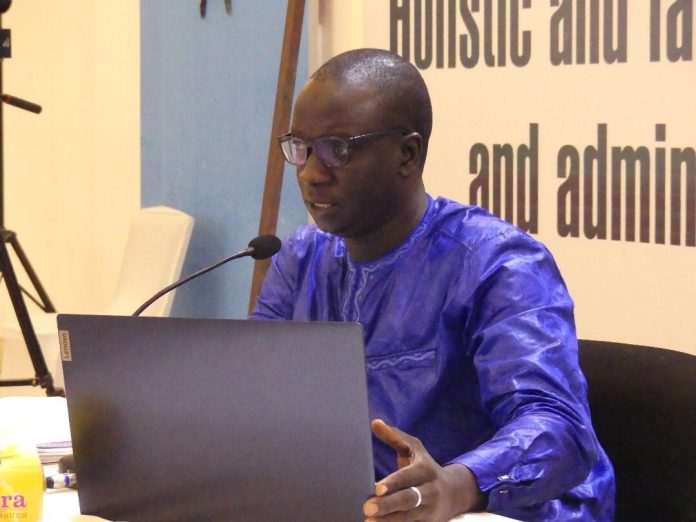By Makutu Manneh
Photo: Witness Jongo
Mr Modou Jonga, the former Chief Executive Officer (CEO) of Brikama Area Council (BAC) on the 8th of August, 2024, reappeared before the Local Government Commission of Inquiry and admitted that he did not follow procurement rules while purchasing goods for the Council, amounting to One Million, Four Hundred and Forty-four Thousand Six Hundred and Nineteen Dalasi, Eleven Butut.
These purchases were queried in the 2022 second quarter Internal Audit Report of the Council, stating that authorities’ signatures on the vouchers for the buying of these goods were not completed.
Former CEO Jonga agreed that these procurements did not follow due process as well as the GPPA regulations. However, he indicated that these occur in instances when one of them (CEO and Director of Finance) will not be in office and there is a need to effect payments to receive their supplies for the day.
“The process will continue with the expectation that when the one who did not sign a report to work will sign the voucher, but we will have other pressing issues and forget to sign,” he said.
Lead Counsel Patrick Gomez told the witness that these are the pressing issues because these are the reasons why he is employed to sign documents and make sure council monies are spent right and due procedures are followed.
“This can be genuine to you, but public institutions do not operate based on how you see it. This is not your show or your world. You are employed to follow rules and do the right thing,” Counsel Gomez told him. The witness agreed that this is not justifiable.
He agreed that where one signs (CEO or the Director of Finance) a voucher without the other, the voucher is incomplete and that payment should not have been effected.
However, he requested more time to find out more about these issues before he can take liability.
Witness Jonga was also questioned about the internal audit’s observation that some private vehicles were fueled by the council’s revenue.
At this juncture, Counsel Gomez revealed to him instances where some of these vehicles, namely, BJL 5669R owned by Buba Bah was given 10 liters fuel, BJL 1921 owned by AbdouliePanneh 40 liters, and BJL 2329 owned by Lamin Cham 10 liters.
Witness Jonga said there are instances where they have to allocate fuel to non-council vehicles to carry out council’s activities, adding that he remembered Buba Bah was given the 10-liter fuel to help them transport tires they purchased from Jeswang.
He said he made this decision for Buba to be given the 10 liters of fuel.
“Buba is a supplier with the council. We need to transport these tires we brought from Jeswang to the office and all the council vehicles are out for collection and Buba happens to be around. We asked if he could help us to transport the tires,” He explained.
When the counsel asked him who has the responsibility to deliver when it comes to having a contract with the supplier, the witness responded that the purchases were not based on framework contract because by then they do not have a framework contract. He said he agreed the fuel allocation was unlawful.
Witness Jonga told the commission Abdoulie Panneh and Lamin Cham’s cases are for community work. He said when communities requested for rehabilitation or other work from the council, it happened that the Council didn’t have enough vehicles to carry out the work, they provided fuel to non-council vehicles.
“The communities will request through my office and I will assign the Director of Planning and Development to conduct an assessment of the request,” he said.
According to him, based on the recommendations of the Department of Planning and Development, he will approve and allocate fuel for community activities.
He argued that a process was followed in allocating these fuels to the non-council vehicles.
“If you look at the Local Government Finance and Audit Act 2004, it says no approbation of funds by the council shall be made out of the funds of the council unless it is approved in the budget,” Counsel Gomez read out to the witness.
Witness Jonga said, “If fuel is not provided to non-council vehicles for these services, the communities will be deprived of the services they request.”
The counsel told him this meant he was not doing his job as CEO or the management was not doing their job.
The witness then said they used the framework contract agreement in providing these fuels and the commission asked him to provide them with the agreement.


















